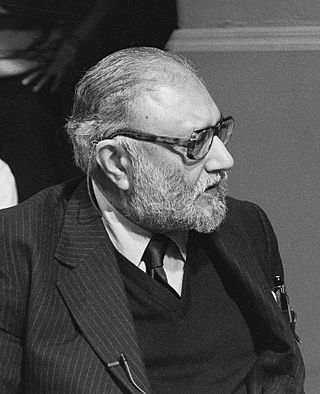
Mohammad Abdus Salam was a Pakistani theoretical physicist and a Nobel Prize laureate. He shared the 1979 Nobel Prize in Physics with Sheldon Glashow and Steven Weinberg for his contribution to the electroweak unification theory. He was the first Pakistani and the first Muslim from an Islamic country to receive a Nobel Prize in science and the second from an Islamic country to receive any Nobel Prize, after Anwar Sadat of Egypt.

Abdul Qadeer Khan, NI, HI, FPAS, known as A. Q. Khan, was a Pakistani nuclear physicist and metallurgical engineer who is colloquially known as the "father of Pakistan's atomic weapons program".

The Higher Education Commission is a statutory body formed by the Government of Pakistan which was established in 2002 under the Chairmanship of Atta-ur-Rahman. Its main functions are funding, overseeing, regulating and accrediting the higher education institutions in the country.
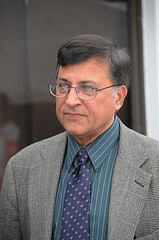
Pervez Amirali Hoodbhoy is a Pakistani nuclear physicist and activist who serves as a professor at the Forman Christian College and previously taught physics at the Quaid-e-Azam University. Hoodbhoy is also a prominent activist in particular concerned with promotion of freedom of speech, secularism, scientific temper and education in Pakistan.
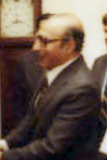
Agha Shahi, NI, was a Pakistani career Foreign service officer who was the leading civilian figure in the military government of former President General Zia-ul-Haq from 1977 to 1982. A diplomat and technocrat by profession, he joined Foreign Services in 1951 and held important diplomatic assignments in the United States, China, and the United Nations. He served as the Foreign secretary— the leading bureaucratic position in Pakistan Government— in 1973 until 1977, after Zulfikar Ali Bhutto's government was dismissed.
A water-fuelled car is an automobile that hypothetically derives its energy directly from water. Water-fuelled cars have been the subject of numerous international patents, newspaper and popular science magazine articles, local television news coverage, and websites. The claims for these devices have been found to be pseudoscience and some were found to be tied to investment frauds. These vehicles may be claimed to produce fuel from water on board with no other energy input, or may be a hybrid claiming to derive some of its energy from water in addition to a conventional source.
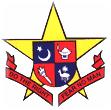
The Sadiq Public School (SPS) is a college-preparatory boarding school located in Bahawalpur, Punjab, Pakistan. It also takes day pupils. It is one of the largest schools in Pakistan and its area of 451 acres (1.83 km2) makes it both the largest in the country and in continental Asia.

Aftab Ghulam Nabi KaziSPk, SK, also known as AGN Kazi, was a Pakistani civil servant and a bureaucrat during the Cold War and during the post cold war. Kazi was born in Sindh, Bombay Presidency, in 1919 to an academic family. He started his career in the Indian Civil Service in 1944 and served as the Deputy Commissioner of Bihar and Orissa. After the partition of India, Kazi migrated to Pakistan and joined the Provincial Government of Sindh, and held positions such as Secretary of Finance and Secretary to the Governor.

The Sindh Muslim Government Law College or S. M. Law College is one of the oldest law schools of Pakistan, situated in Karachi, Sindh. The college has produced numerous notables including Chief Justices of Pakistan, Chief Justices of Federal Shariat Court, Chief Ministers of Sindh, Federal Ministers, and many judges of the Supreme Court of Pakistan and Sindh High Court.

Dayaram Jethamal Sindh Government Science College, commonly known as DJ Science College, is a public community college that is affiliated with the University of Karachi — it is located near Burns Road in Karachi, Sindh, Pakistan.

Science and technology is a growing field in Pakistan and has played an important role in the country's development since its founding. Pakistan has a large pool of scientists, engineers, doctors, and technicians assuming an active role in science and technology. The real growth in science in Pakistan occurred after the establishment of the Higher education Commission in 2002 which supported science in a big way and also became the major sponsor of the Pakistan Academy of Sciences under the leadership of Prof. Atta-ur-Rahman. The emphasis was placed on quality rather than numbers during this period. The quality measures introduced by Prof. Atta-ur-Rahman as Founding Chairman HEC included:1) All Ph.D. thesis were evaluated by eminent foreign scientists,2) All PhD theses and research papers were checked for plagiarism 3) Some 11,000 students were sent abroad to leading universities for PhD level training and absorbed on their return, 4) Appointments at faculty positions were linked to international stature of the applicants as judged from their international publications, patents and citations, and (5) Quality Enhancement Cells were established in all universities for the first time in the history of the country. (6) The minimum criteria for establishment of a new university were approved by the Cabinet and universities that did not meet this criteria were closed down. (7) The Model University Ordinance was approved setting the governance parameters for new universities. (8) A list of fake higher education institutions was prepared and made public. (9) Quality Assurance Agency (QAA) was set up within the Higher Education Commission that established Quality Enhancement Cells (QECs) as its operational units in public and private-sector universities across the country. (10) The funding of universities was linked to excellence in teaching and research under a formula based funding mechanism that considered enrolment, subjects and quality of teaching and research. The first IT policy and implementation strategy was approved under the leadership of Prof. Atta-ur-Rahman, then Federal Minister of Science & technology, in August 2000 which laid the foundations of the development of this sector On the request of Prof. Atta-ur-Rahman, Intel initiated a nationwide programme to train school teachers in Information and Communication technologies in March 2002 which has led to the training of 220,000 school teachers in 70 districts and cities across Pakistan. A 15-year tax holiday was approved on the recommendation of Prof. Atta-ur-Rahman which has resulted in growth of IT business from $30 million in 2001 to over $3 billion. The Pakistan Austria University of Applied Engineering (Fachhochschule) has been established in Haripur Hazara under a Steering Committee Chaired by Prof. Atta-ur-Rahman in which students will get degrees from several Austrian universities. Pakistan's growth in scientific output can be seen from the fact that in 1990 Pakistan published 926 scholarly documents while in 2018 the number rose to 20548, a twenty times increase.In contrast India published 21443 scholarly documents in 1990 and the number rose to 171356 in 2018, an eight times increase. In 2018, 336 people per million were researchers in the R&D in Pakistan compared to 256 people per million being researchers in India. The reforms begun by Prof. Atta-ur-Rahman FRS in 2003-2008 have continued over the subsequent decade and according to the Web of Science report, there was a 300% growth in research publications in 2019 over the decade, with 2019 marking the first year in which Pakistan was ranked above the world average in research. In 2019, Pakistan produced 300% more publications indexed in the Web of Science Core Collection than in 2010. In the decade of 2010-2019, more than half of Pakistan’s research was published in journals with Impact Factor. The global influence of Pakistan’s research is increasing as scientists in the country are publishing more in top quartile journals. The Category Normalized Citation Impact of Pakistan’s publications has risen from 0.67 to 1.03. output. As of 2020, Pakistan has 85% teledensity with 183 million celllular, 98 million 3G/4G and 101 million broadband subscribers, due to the foundations laid by Prof. Atta-ur-Rahman of the IT and telecom industry during 2000-2008. In an analysis of scientific research productivity of Pakistan, in comparison to Brazil, Russia, India and China, Thomson Reuters has applauded the developments that have taken place as a result of the reforms introduced by Prof. Atta-ur-Rahman FRS, since Pakistan has emerged as the country with the highest increase in the percentage of highly cited papers in comparison to the "BRIC" countries
Brigadier Imtiaz Ahmed, SBt, TI(m), also known as Imtiaz Billa, is a retired engineering officer in the Pakistan Army Corps of Engineers, and former spy, who served as the Director-General of the Intelligence Bureau from 1990 to 1993.
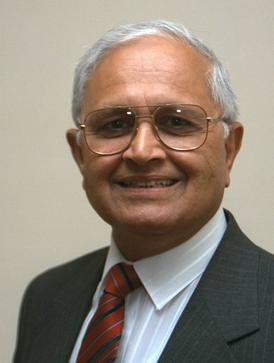
Munir Ahmad Khan, NI, HI, FPAS, was a Pakistani nuclear reactor physicist who is credited, among others, with being the "father of the atomic bomb program" of Pakistan for their leading role in developing their nation's nuclear weapons during the successive years after the war with India in 1971.

Agha Rafiq Ahmed Khan a Pakistani jurist belongs to Garhi Yasin in Shikarpur District of Sindh, Pakistan. He is the son-in-law of Justice Mushtak Ali Kazi, who was a Judge of High Court of Sindh and Balochistan. Justice Agha is a Senior Advocate of the Supreme Court of Pakistan. He served as the 12th Chief Justice of the Federal Shariat Court of Pakistan from 2009-2014.

Waqar Zaka is a Pakistani television host, activist and cryptocurrency expert/entrepreneur.
The Pakistani textbooks controversy refers to claimed inaccuracies and historical denialism. The inaccuracies and myths promote religious intolerance and Indophobia and lead to calls for curriculum reform. According to the Sustainable Development Policy Institute, Pakistan's school textbooks have systematically inculcated anti-Indian discrimination through historical omissions and deliberate misinformation since the 1970s.











